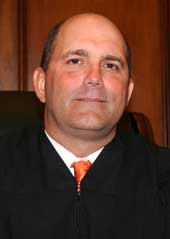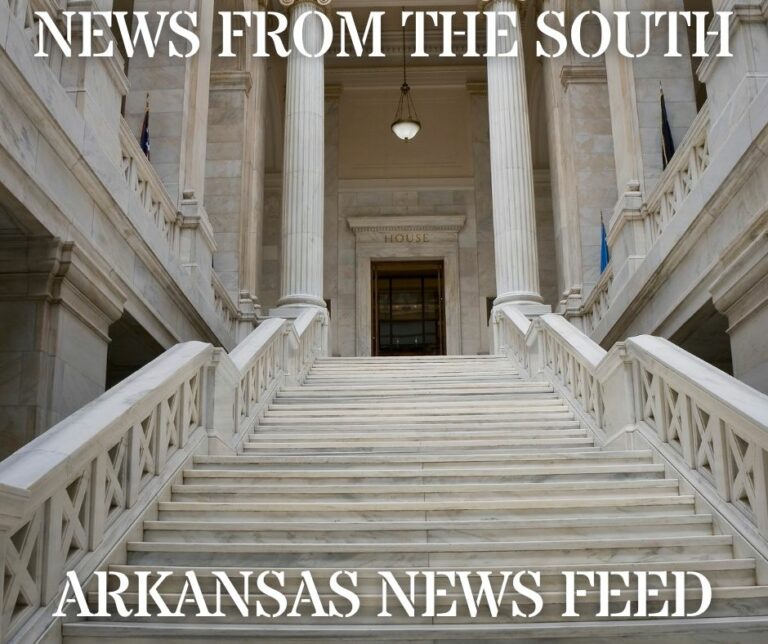Mississippi Today
Auditor alleges mismanagent of funds by health department
Three nonprofits received over $850,000 in federal grants for HIV prevention between 2021 and 2024 but administered only 35 HIV tests during that period, State Auditor Shad White alleges in a report released Monday.
The report identified reimbursements for alcohol, late-night rideshares, purchases from a smoke shop, the rental of a nightclub owned by one group’s executive director and a declined payment for gift cards. All of the payments were approved by the Mississippi Department of Health, the agency responsible for overseeing distribution of the funding to community-based organizations.
“The lapses identified are unacceptable and not reflective of our agency’s standards or mission,” the health department said in a press release Monday.
The agency could not produce monthly reports for grant activities or documentation of hundreds of thousands of dollars of expenses, the report said. Nor could it provide all of the funding agreements or say whether the organizations were aware they were required to report testing data, a spokesperson for the auditor’s office told Mississippi Today.
The grant funding was meant to help states establish and maintain HIV prevention and surveillance programs, and HIV testing was an element of each organization’s agreement. The grants also paid the nonprofits to educate the public about HIV and hire community health workers.
Mississippi has the sixth highest rate of new HIV diagnoses in the country, and the majority of the state’s prevention efforts are funded with federal dollars.
“It’s almost like our government hates us,” said Auditor Shad White in a press release. “This kind of spending defies all common sense and is an insult to hardworking taxpayers.”
Lorena Quiroz, the executive director of Immigrant Alliance for Justice and Equity, said the nonprofit submitted all required monthly reports and expense documentation to the health department.
Love Inside for Everyone and Love Me Unlimited 4 Life, the other two organizations investigated by the state auditor, did not respond to questions from Mississippi Today.
None of the organizations referenced in the audit report still have grants or contracts with the health department, and the agency has already taken steps to hire new leadership in its STD/HIV division and tighten management of grants, it said in a press release.
The audit probes a period when the health department’s STD/HIV division was severely understaffed after public health priorities shifted to the COVID-19 pandemic and skyrocketing syphilis cases in the state. Around the same time, the health department began receiving tens of millions of dollars in additional federal funding for HIV prevention efforts as a part of an initiative launched by President Donald Trump during his first term in office to end the domestic HIV epidemic.
But the funding increases have resulted in only a slight dent in new HIV cases. New diagnoses dropped 5% in the first three years of reported data since the state began receiving the additional federal dollars, according to Centers for Disease Control and Prevention data published by AIDSVu – far from keeping up with the federal government’s ambitious goals of reducing new diagnoses 75% by 2025 and 90% by 2030.
Increasing HIV testing in community settings is one of the plan’s core strategies.
Immigrant Alliance for Justice and Equity, a Jackson nonprofit that advocates for immigrant and indigenous communities in Mississippi, was contracted to take steps to become a rapid HIV testing site, but did not conduct any tests because the health department did not provide a phlebotomist, Quiroz told Mississippi Today in an email.
It is unclear why the organization would have required a phlebotomist, as rapid tests are administered with a finger prick or saliva. Immigrant Alliance for Justice and Equity did not respond to a follow-up question for clarification.
Quiroz said HIV testing materials worth $11,412 were lost in a storm that destroyed the organization’s building and roof. The storm occurred in June 2023, one month before the nonprofit’s agreement with the health department ended and 10 months after the supplies were purchased.
Health department records showed that Love Inside for Everyone, a LGBT+ advocacy nonprofit, performed 35 HIV tests between 2021 and 2024.
Love Unlimited 4 Life, a transgender advocacy organization no longer in operation, recieved grant funding between 2021 and 2023 for the salaries of two community health workers. Health department records showed that no HIV tests were administered by the organization.
The nonprofits’ grant agreements also included education and testing events. The auditor’s report called several events “questionable,” including a Latinx pride month and HIV awareness event hosted by Immigrant Alliance for Justice and Equity that exceeded its proposed budget and included alcohol purchases in a request for reimbursement.
Love Inside for Everyone used grant funding to rent Metro 2.0, a nightclub owned by the organization’s executive director, Temica Morton, a possible conflict of interest.
Due to the health department’s lack of grant monitoring, it could not say if HIV testing or awareness activities occurred at the events, the auditor’s office said.
Several federal grants Mississippi relies on for HIV prevention efforts have been cut or destabilized since the Trump administration took office earlier this year. Public health experts have argued these cuts will undermine HIV testing activities.
White said the audit shows that the Trump administration’s cuts to HIV prevention efforts have been unfairly criticized in a video on Fox News Digital.
“Our audit shows that when you dig into how this money is actually being spent, it’s not actually helping people with HIV/AIDs, it’s not helping to test people for HIV, it’s instead being wasted,” White said.
The health department reiterated the importance of community partners to advancing public health goals in a statement.
“It is important to underscore that these findings do not reflect the value of many nonprofit partners we continue to work with across Mississippi. Partnerships remain critical to our public health mission.”
This article first appeared on Mississippi Today and is republished here under a Creative Commons Attribution-NoDerivatives 4.0 International License.
The post Auditor alleges mismanagent of funds by health department appeared first on mississippitoday.org
Note: The following A.I. based commentary is not part of the original article, reproduced above, but is offered in the hopes that it will promote greater media literacy and critical thinking, by making any potential bias more visible to the reader –Staff Editor.
Political Bias Rating: Center-Right
The article focuses on State Auditor Shad White’s audit of the Mississippi Department of Health’s management of federal HIV prevention funds, detailing allegations of mismanagement, misuse of funds, and a lack of oversight. The tone and framing of the piece, particularly White’s statements criticizing the health department’s actions and the Trump administration’s cuts to HIV prevention funding, suggest a critical stance towards government inefficiency. However, it also provides the health department’s response, stating the importance of community partnerships and clarifying that not all nonprofit partners are at fault. The overall presentation is fact-based but leans towards a critique of government spending and management, which aligns with a center-right perspective critical of governmental waste and inefficiency.
Mississippi Today
‘Get a life,’ Sen. Roger Wicker says of constituents
A note from Adam Ganucheau: A couple hours after this column published, Sen. Roger Wicker’s office reached out and demanded a correction, saying the senator’s “get a life” comment was directed to himself and not to constituents. That’s certainly not how I nor hundreds of Mississippians who commented on and shared the viral video heard it. Mississippi Today has updated portions of this column to reflect concerns raised by Wicker’s office. Here’s a link to the video/audio of his response to the question about constituent concerns. Mississippians can decide for themselves what Wicker meant.
When 34-year-old Thad Cochran arrived in Washington after his first election in 1972, the Republican felt it important to document what he’d heard and learned from Mississippians on the campaign trail and share it with his young staff.
He sat down at a typewriter and wrote a memo titled “General Responsiveness” and dated March 14, 1973:
During the campaign I detected a very strong animosity among the people toward government and those associated with government bureaus and agencies. This included elected officials and those associated with them. Part of the cause of this attitude was due to a lack of feeling or understanding by government people for the needs and opinions of the average citizen. We are all in a job to represent all our constituents. We are not the bureaucracy. A constituent who asks us for help should be assured to be in need of help with our office as his last resort. A constituent who writes a letter should be made to feel by our response that he is glad he wrote us. A constituent who claims to have been wronged by the government should be assumed to be correct. Everyone should guard against developing the attitude that we are better than, smarter than or more important than any constituent. We do not hold a position of authority over any constituent. We are truly servants of the people who selected us for this job.
Every year from 1973 through 2018, over his three U.S. House terms and six U.S. Senate terms, Cochran shared that memo with every staffer who worked in his offices. The guidance, he said all those years, was a necessary reminder to show respect to the people who offer feedback or need help. He never wanted his staff or himself to forget who sent them to Washington.
The memo, like so many other things, serves as a stark reminder that Cochran was among the last in a bygone era of American politics. The perspective he wrote and shared is a far cry from what Mississippians have been getting recently from our current U.S. senators.
“Surely everybody else has better things to do with their time,” senior U.S. Sen. Roger Wicker said to a room full of constituents earlier this month when asked about calls and emails his office has been getting. After half-heartedly explaining that he does see a list of names of people who reach out to his office, he quipped: “Get a life.”
Wicker’s office said Friday that the senator directed “Get a life” to himself, not to constituents.
Wicker, who typically chooses his words a little more carefully, perhaps has been trying to match his junior colleague’s energy.
“Why is everyone’s head exploding?” U.S. Sen. Cindy Hyde-Smith said in April to Mississippi constituents who had expressed concerns over slashing federal Medicaid spending. “I can’t understand why everyone’s head is exploding.”
There are many kind staffers working for Republicans Wicker and Hyde-Smith who are helpful to Mississippi constituents in any number of ways privately or behind the scenes. These people care deeply about serving their home state and they do it well, and they cannot help how their bosses address the public. But, boy, their phones must be blowing up more than ever since the senators made these comments.
Consider, for a moment, what it means that we have devolved from having a leader who believed that “a constituent who claims to have been wronged by the government should be assumed to be correct” to one who thinks telling constituents to “get a life” is appropriate. Think about the fact that we replaced a leader who regularly reminded his staff that “we are truly servants of the people who selected us for this job” with one whose gut response to legitimate concerns from constituents is that their “heads are exploding.”
Just … wow. To call it alarming doesn’t fully encapsulate the gravity of their behavior. It’s enough to discourage even the most optimistic among us about the present and future of our state and our nation.
It’s enough to inspire you to ponder, in this intense political climate when unprecedented and harrowing federal government decisions are being made and going largely unchecked every day, whether our current U.S. senators even remember why they’re in Washington, why we sent them there.
It is necessary, in the shortest possible order, to ask and answer for ourselves what we should expect of our elected officials and whether we should feel OK about being dismissed or ignored outright like this.
You don’t have to be a Democrat to think that this behavior is out of line. Plenty of Republicans — some publicly and many privately — are increasingly disturbed by what’s happening in Washington. Regardless of your own personal political beliefs, be honest with yourself about whether you can read these comments from our senators and still feel that your best interests are being represented.
Sadly, we can no longer ask Cochran to help us answer these questions, but it sure seems clear where he’d stand. What about you?
READ MORE: Mississippi, where ‘We Dissent’ means nothing to elected officials
This article first appeared on Mississippi Today and is republished here under a Creative Commons Attribution-NoDerivatives 4.0 International License.
The post 'Get a life,' Sen. Roger Wicker says of constituents appeared first on mississippitoday.org
Note: The following A.I. based commentary is not part of the original article, reproduced above, but is offered in the hopes that it will promote greater media literacy and critical thinking, by making any potential bias more visible to the reader –Staff Editor.
Political Bias Rating: Center-Left
The content critiques Republican senators for their dismissive attitude toward constituents, contrasting them with a more respectful past leader. It highlights concerns about current political behavior and governance, emphasizing accountability and responsiveness to the public. While it acknowledges that some Republicans privately share these concerns, the tone and framing suggest a leaning that favors more progressive or reform-minded perspectives, typical of center-left commentary.
Mississippi Today
UFC cage fighting at the White House: Will Mississippi follow the lead?
Change occurs so quickly in the 250th year of our nation’s existence sometimes we feel the need to call timeout, survey the rapidly shifting landscape and wonder: What next? What in Hades happens next?
We have a former Fox Network weekend host in charge of our military. We have a former professional wrestling promoter heading up the Department of Education (which she wants to scrap entirely). We have an anti-vaccine advocate leading the Department of Health and Human Services. Hard to tell these days who are our allies and who are our enemies. Few of our traditional allies trust us anymore. Our president creates, then delays, then reduces and then increases tariffs so often we can’t keep up.
Indeed, what the heck comes next?
Well, stop the presses. Now we know what’s next: Cage fighting on the White House grounds, UFC style. Trump has indicated he wants it to happen. His close friend Dana White, CEO of Ultimate Fighting Championship (UFC), says unequivocally this is going to happen. Paramount, which has been so much in the news lately, will televise it. Millions of dollars will be made. Eyes will be blackened! Brains will be concussed!! Blood will flow!!! Ratings will soar!!!! MAGA!!!!!
Ancient Rome had the Colosseum and gladiators fighting to the death for the entertainment of the emperor. Washington will have cage fighting, no holds barred, at the White House, heretofore a National Historic Landmark so designated for its significance to American history, architecture, arts and culture. At least there will be no lions in the White House cage. Or will there be? Perhaps alligators.
The target date is July 4, 2026. As Trump put it in a speech in Iowa: “We’re going to have a UFC fight, think of this, on the grounds of the White House. We have a lot of land there. … We’re going to have a UFC fight, championship fight, full fight.”
Yes, he really did say we have a lot of land there, leaving out the obvious. It doesn’t take much land for a caged-in, 746-square foot UFC octagon. Besides, there’s not enough room for a golf course, which Trump might prefer.
U.S. presidents have dabbled in sports before, though not quite the way Trump, who owns 17 golf courses worldwide, has immersed himself in golf. Trump in his second term reportedly has played golf on a quarter of the days he has been president, costing taxpayers roughly $70 million in travel and secret service expenses.
Previous presidents have not been quite so active, although Nixon installed a bowling alley in the White House basement. Eisenhower added a putting green on the White House lawn. Clinton added a jogging track to the White House grounds. Obama loved to play pick-up basketball. Most all recent presidents have been huge sports fans. But, at least to my knowledge, Trump is the first UFC aficionado in the White House.
Which brings to my mind this question: Which president would have been best at UFC? My money definitely would be on sturdy Teddy Roosevelt, who boxed at Harvard and sparred at both boxing and judo while president. He was a fitness freak. He also found time as president to save college football, although I’m not at all sure President Teddy would fancy what college football has become.
There are other president-athletes to consider. Abe Lincoln was a champion amateur wrestler and would have had a decided advantage in reach over most presidents. Gerald Ford was a Michigan football star who played on two national championship teams and was the Wolverines’ MVP as a senior. Ford was in the trenches, a center on offense and a linebacker on defense. This was back before facemasks. Clearly, he was a tough guy.
William Howard Taft, our 27th president, was a varsity heavyweight wrestler at Yale. In retrospect, it seems a shame sumo wrestling wasn’t popular in the early 20th century. Taft, 5 feet, 11 inches tall and weighing just over 350 pounds, would have been a natural.
On the local front, you don’t have to read Mississippi Today daily to know that Mississippi’s current political leaders often follow President Trump’s lead. Indeed, there seems a highly competitive contest to see which Mississippi politico can get the tightest grip on Trump’s coattails. They all want to follow Trump’s blueprint and make Mississippi great again.
With that in mind, can UFC fighting at the Governor’s Mansion, right there on Capitol Street, be far behind?
Think of the possibilities. For starters, how about Shad White vs. Andy Gipson? Who you got?
Clarification: This column was updated to reflect that the United States of America is in its 250th year of existence.
This article first appeared on Mississippi Today and is republished here under a Creative Commons Attribution-NoDerivatives 4.0 International License.
The post UFC cage fighting at the White House: Will Mississippi follow the lead? appeared first on mississippitoday.org
Note: The following A.I. based commentary is not part of the original article, reproduced above, but is offered in the hopes that it will promote greater media literacy and critical thinking, by making any potential bias more visible to the reader –Staff Editor.
Political Bias Rating: Center-Left
The article adopts a critical tone toward former President Trump and his administration, highlighting controversial appointments and policies with a degree of skepticism and irony. It uses humor and historical comparisons to question the appropriateness of hosting UFC cage fighting at the White House, suggesting a disapproval of the spectacle and the current political climate. While not overtly partisan, the piece leans toward a center-left perspective by scrutinizing conservative figures and policies more than offering balanced praise.
Mississippi Today
Trump nominates two Mississippi Supreme Court justices to federal bench
President Donald Trump on Tuesday announced his nomination of James Maxwell and Robert Chamberlin, two Mississippi Supreme Court justices, to vacant federal judicial seats in northern Mississippi.
Pending Senate confirmation of the nominations, Gov. Tate Reeves will appoint two state high court justices temporarily, then special elections will be held in November of 2026.
Trump made the announcement on Truth Social, his social media platform, where he said the two justices, if confirmed, would uphold the Constitution and the rule of law. Both Chamberlin and Maxwell, through the state Administrative Office of the Court’s public information officer, declined to comment.
The two nominations will go before the U.S. Senate for confirmation. Both of Mississippi’s Republican U.S. senators, Roger Wicker and Cindy Hyde-Smith, commended Trump for nominating the two jurists and said they supported their confirmation.
“I want to thank President Donald Trump for his nomination of two solid and experienced jurists for the U.S. District Court,” Wicker said in a statement. “I wholeheartedly support Justice Chamberlin and Justice Maxwell and look forward to their speedy confirmation.”
Maxwell earned his undergraduate and law degrees from the University of Mississippi. Former Gov. Haley Barbour in February of 2009 appointed Maxwell to the state Court of Appeals. Maxwell was elected to the post in 2010 and reelected in 2014. Former Gov. Phil Bryant appointed him to the state Supreme Court in January 2016. He was later elected to an eight-year term in November of 2016 and reelected in 2024.

Chamberlin earned his undergraduate and law degrees from the University of Mississippi. He first served as a state circuit court judge for 12 years in the 17th Circuit District. In 2016, he was elected to an open seat on the state Supreme Court and reelected in 2024.
Before becoming a judge, Chamberlin was a member of the state Senate for five years, representing DeSoto County.
Chamberlin and Maxwell will replace U.S. District Judges Michael Mills and Sharion Aycock, both of whom decided to take senior status in recent years.
It’s unclear who Reeves might appoint to fill the vacancies. He has previously filled judicial vacancies on the state Court of Appeals with prosecutors or circuit court judges with prosecutorial experience, such as the appointments of Judge John Weddle and Judge John Emfinger.
This article first appeared on Mississippi Today and is republished here under a Creative Commons Attribution-NoDerivatives 4.0 International License.
The post Trump nominates two Mississippi Supreme Court justices to federal bench appeared first on mississippitoday.org
Note: The following A.I. based commentary is not part of the original article, reproduced above, but is offered in the hopes that it will promote greater media literacy and critical thinking, by making any potential bias more visible to the reader –Staff Editor.
Political Bias Rating: Center-Right
The content presents a straightforward report on President Donald Trump’s judicial nominations, highlighting support from Republican senators and emphasizing the nominees’ qualifications and conservative credentials. The tone is neutral and factual, but the focus on Trump and Republican figures, along with positive framing of their actions, suggests a slight lean toward center-right perspectives without overt partisan commentary.
-
News from the South - Tennessee News Feed3 days ago
GRAPHIC VIDEO WARNING: Man shot several times at point-blank range outside Memphis convenience store
-
News from the South - Texas News Feed3 days ago
Kratom poisoning calls climb in Texas
-
News from the South - Kentucky News Feed3 days ago
Unsealed warrant reveals IRS claims of millions in unreported sales at Central Kentucky restaurants
-
Local News7 days ago
Bay St. Louis artist commemorates Amtrak’s return with hundreds of handmade medallions
-
News from the South - Arkansas News Feed5 days ago
Idaho is losing OB-GYNs. Doctors who remain are trying to shoulder the extra burdens.
-
News from the South - Georgia News Feed7 days ago
RCSS: Students showed growth on Georgia Milestones Assessments for 2024-2025
-
Our Mississippi Home5 days ago
Pride of Mississippi Marching Band to Kick Off Season with Free Concert
-
News from the South - Florida News Feed6 days ago
Summer heat, storms continue to swamp Central Florida. Here’s what to expect












































